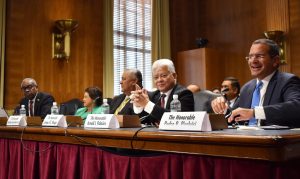IN TESTIMONY BEFORE US SENATE ENERGY AND NATURAL RESOURCES COMMITTEE
Palacios backs Marianas resident bill
Governor also seeks US Senate’s help to repeal CW touchback provision

CNMI Gov. Arnold I. Palacios, second from right, is joined by, from left, U.S. Virgin Islands Gov. Albert Bryan Jr., Guam Gov. Lourdes “Lou” Leon Guerrero, American Samoa Gov. Lemanu P.S. Mauga, and Puerto Rico Gov. Pedro R. Pierluisi during a U.S. Senate Committee on Energy and Natural Resources hearing last week. (MARIANAS CONGRESSIONAL OFFICE PHOTO)
Gov. Arnold I. Palacios has expressed strong support for a bill that would encourage approximately 1,600 long-term foreign workers living on the islands since 2015 to remain in the CNMI by offering them permanent resident status.
In his testimony before the U.S. Senate Energy and Natural Resources Committee on the “State of the U.S. Territories” last Thursday, Palacios noted that a major part of the CNMI’s struggle to carry out critical infrastructure and development projects is a shortage of labor and serious uncertainties affecting the stability of the Commonwealth’s workforce.
The governor also appealed to the committee to support in the repeal of the “touchback provision,” noting the diminishing number of Commonwealth-Only Transitional Worker program permits issued every year and with the CW program’s end just around the corner in 2029.
The “touchback provision” requires CW workers to exit the CNMI for at least 30 days prior to the submission of their third renewal petition. That means they must stay away from the CNMI while their third renewal permit is being processed and may only return once the permit is approved—a period that could last several months.
Palacios appealed for the Senate’ support to consider amending the U.S. Workforce Act of 2018, which governs the administration of the CW program.
Delegate Gregorio Kilili C. Sablan (D-MP), who recently introduced the bill to grant permanent residence to certain foreign long-term workers—called H.R. 560 or the Marianas Population Stabilization Act—stated over the weekend that he is thankful to Palacios for voicing his support for his bill.
Sablan stated in his e-kilili newsletter that his bill is intended to shore up the shrinking Marianas population—both to protect the islands’ economic viability and as a response to Chinese expansionism in the Western Pacific.
Under H.R. 560, 21 foreign investors in the Marianas since before 2009 could also apply for the permanent Marianas-only resident status.
Palacios said in his testimony Thursday that, as Sablan has stated, the population loss in the CNMI and resulting loss of economic viability not only hurts everyone in the Marianas, but also has implications for the U.S. strategic position in the Western Pacific.
Palacios agreed with Sablan that with increasing competition for dominance from China, the United States needs to be strengthening its position in the region, not shrinking in significance.
On the touchback provision, the governor noted that processing times for CW-1 permits are so delayed that employers wait months after the petition start date to receive the necessary approvals to secure entry of the CW-1 permitholder to the CNMI.
As a result, he said, a large proportion of workers will be required to depart all at the same time without a clear timeline for their return, and at a time when businesses are attempting to regain normalcy in operations.
Palacios said the touchback provision’s disruptions to families, businesses, and the overall economy cannot be overstated.
He said that for businesses reliant upon a set of number of employees, the touchback requirement necessitates the onboarding and training of additional staff to ensure that operations continue.
The governor said these additional costs create a significant burden on small businesses attempting to recover from the pandemic.
“We do need help. And I am here to seek your assistance to contribute to the CNMI’s economic recovery and financial sustainability,” Palacios told the committee.
Sablan, who attended the committee hearing to support Palacios, said the threat of China was a recurring theme in statements and questions from most senators.
Sablan said ranking committee member John Barasso (R-Wyoming) acknowledged that “Chinese aggression in the Indo-Pacific is a serious and growing threat” and “the territories in the Pacific are on the frontlines of Chinese aggression.”
Sablan said that Barasso added that Guam, the CNMI, and American Samoa are not only vital to national security interests, but they are also home to American citizens and nationals.
Sablan said he expects an important focus of the 118th Congress will be measures in the insular areas and nationwide to respond to China.



























